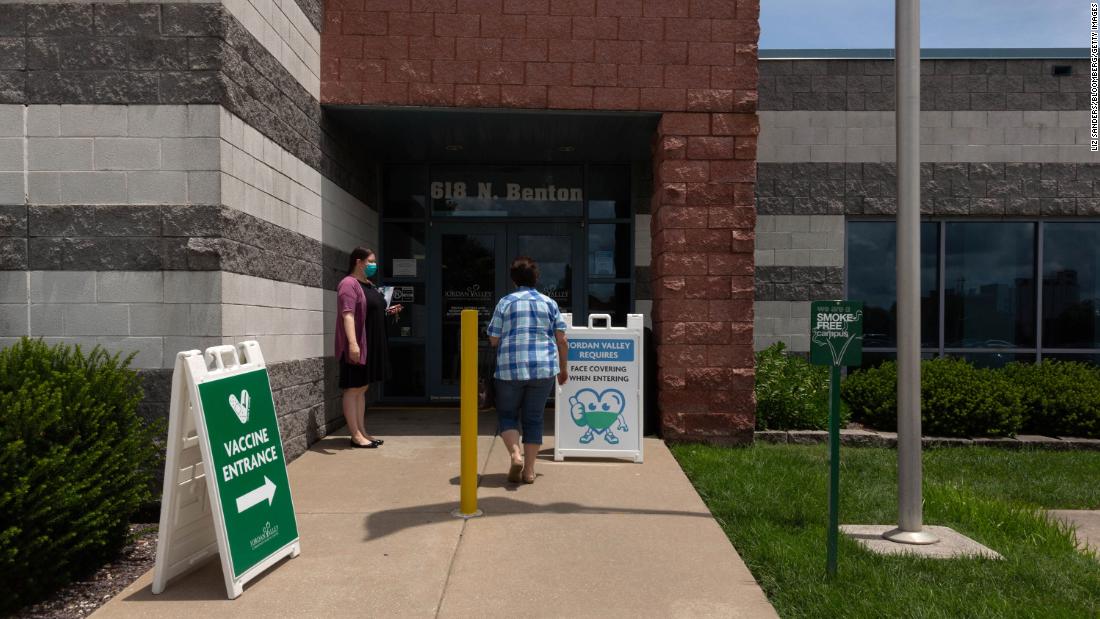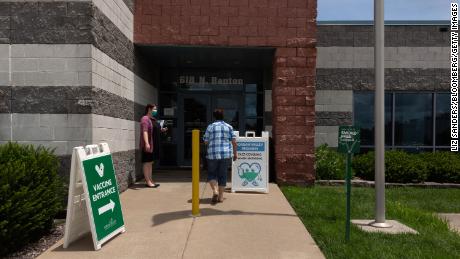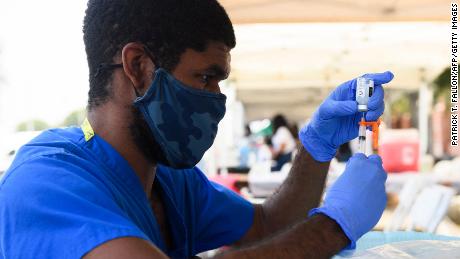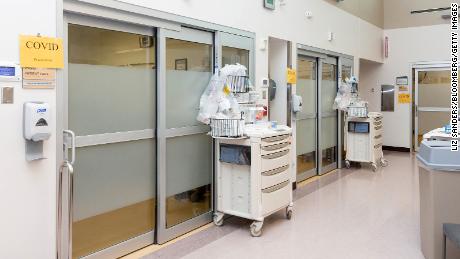The country must do something ‘dramatic’ to protect the US against Covid-19, an expert says
In Arkansas, where only 35.1% of the population is fully vaccinated, the Delta variant has had a big impact, Chancellor of the University of Arkansas for Medical Sciences Cam Patterson said, adding hospitals are “full right now and cases are doubling every 10 days.”
In Missouri, one local health department has asked the state to fund staffing and a location for a Covid-19 care site to handle to rise in severe cases, according to a statement from the Springfield-Greene County Health Department.
There is still hope for avoiding a fall spike, CDC director Dr. Rochelle Walensky said, if enough people get vaccinated. But, if the trend in rising cases continues, cities and states could implement travel restrictions for unvaccinated travelers, she told ABC’s Good Morning America.
“I think now is our moment to really double down on our vaccination efforts and our other prevention interventions,” she said. “We still have to send the same messages as we did last year,” Walensky said.
In an interview on NBC Nightly News, Walensky said that with case rates rising, vaccination rates declining and the Delta variant spreading, things could continue to get worse in the pandemic.
“Right now is the time for locales to follow LA county’s lead,” Wen said.
Colleges and universities requiring vaccinations
Some businesses and hospitals have already required their employees to be vaccinated, and now some universities are implementing requirements as well.
Rhode Island has become the first state where all public and private colleges and universities require their students to be fully vaccinated before returning to campus this fall, Governor Dan McKee announced this week.
Dr. Nicole Alexander-Scott, Rhode Island’s director of health, said in the state’s news release that vaccinations are “key” to having a successful academic year.
“We cannot let our guard down now,” Scott said. “The Delta variant is now circulating in parts of the country where many of our students live. The good news is that the vaccines provide protection against this variant. Anyone who has not been vaccinated should get vaccinated today.”
And the University of California, the nation’s largest public university system, said it plans to mandate that all students, faculty and staff be fully vaccinated before returning to campuses in the fall. Those who are not exempt from receiving the vaccine will be barred from in-person classes, activities, and housing, UC officials announced Thursday.
Experts like Dr. Anthony Fauci have said that local vaccine mandates could be helpful in protecting the US from further surge. And such mandates could become easier for private companies as vaccines move further along.
An average of about 343,000 people are becoming vaccinated each day, a pace less than a quarter of the rate two months ago, when more than 1.3 million people were becoming vaccinated each day.
“Getting full approval — getting out of the emergency use authorization and into full approval — is something that will clear up any legal questions that private employers may have,” former US Health and Human Services Secretary Kathleen Sebelius said Tuesday.
With so many people hesitating or resisting the vaccine and vaccination rates dropping, restrictions to work and school may be key to motivating the public to reach the necessary threshold to slow or stop the spread., experts have said.
Misinformation costing lives
Meanwhile, key reasons for the hesitancy around Covid-19 vaccines are mistrust and misinformation, according to a CNN analysis of data from the US Census Bureau’s Household Pulse Survey.
Nearly half of people who said they will “definitely” or “probably” not get a Covid-19 vaccine cited mistrust in the vaccines as a reason for not getting vaccinated, according to the latest data, published Wednesday and based on survey responses from June 23 to July 5. That’s an increase from about a month ago, when 46% of people who said they did not plan to be vaccinated gave the same reason.
And in the latest survey, more than a half of people who said that they “definitely” or “probably” would not get a Covid-19 vaccine because they were concerned about side effects, up from 49% about a month ago.
“Millions of people don’t have access to accurate information right now, because on social media platforms and other tech platforms we’re seeing the rampant spread of misinformation, and it’s costing people their lives,” US Surgeon General Dr. Vivek Murthy told CNN’s Jake Tapper.
Much of that information frequently comes out of people with good intent, he added, saying that they think they are spreading helpful information, but that often misinformation spreads more quickly than accurate information.
Conversations in social circles may be a big part of the solution, he added.
“It’s about peers talking to peers,” Murthy said during a Stanford University panel event on Thursday. “Remember, all of these conversations first start with listening… so try to understand where somebody is coming from, why they may be worried. It may not always be what you think.”
CNN’s Gregory Lemos, Carma Hassan, Naomi Thomas, Lauren Mascarenhas, Jacqueline Howard, Deidre McPhillips, Virginia Langmaid and Sarah Braner contributed to this report.
![]()








